By Joseph Wiggins
Aberystwyth University has once again run the Students Digital Insights Survey, a survey that asks learners the impact of online and technology implemented learning. This year over 600 students at Aberystwyth University took this survey.
The Key Metrics
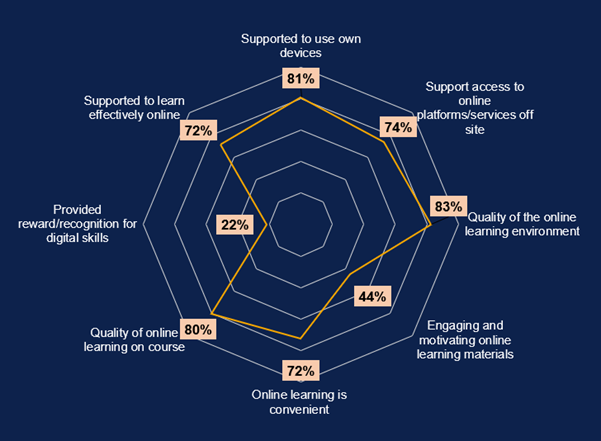
The JISC survey has changed in the last year with some of the key metric questions being changed, for the questions that have stayed very similar or the same we can compare to last year’s results.
| Key Metric | 2020-2021 | 2021-2022 |
| Supported use of own devices | 60% | 81% |
| Access to online platforms off-site | 67% | 74% |
| Online learning environment | 40% | 83% |
| Quality of online learning on course | 69% | 80% |
In a majority of these key metrics we saw a positive increase with Aberystwyth University having improved from the previous year. This trend of improvement is mirrored throughout the survey results. In the case of questions which changed in the key metrics a lot of them are incomparable because of the changes made. For example, last year asked about ‘Well-designed’ online learning materials. This was changed to ‘Engaging and motivating’ online learning materials. With online learning trends questions relating to motivation are typically exceptionally more negative, making questions that use these adjectives much more negative.
Benchmarking Comparison
The issues with comparison with previous year results is not an issue because Jisc run this survey nationally across higher and further education institutions. This wider data gives us suitable benchmarking data.
| Question | Our data | UK Data |
| Supported to use own devices | 62.56% | 57.62% |
| Support access to online platforms / services off site | 74.40% | 69.26% |
| Quality of the online learning environment | 82.56% | 76.93% |
| Engaging and motivating online learning materials | 44.33% | 42.84% |
| Online learning is convenient | 72.36% | 68.03% |
| Quality of online learning on course | 80.39% | 74.32% |
| Provided reward / recognition for digital skills | 21.79% | 24.04% |
| Supported to learn effectively | 71.86% | 66.08% |
With this benchmarking data that shows that AU is ranking higher than the UK national data in almost every one of the key metrics. The gap between our results is quite larger with AU data being higher by 5% in seven of the questions.
The only metric that was comparatively lower when looking at the UK benchmark data is one of the new metrics added this year. The recognition and reward for students digital skills. This is however very in-line with national data and it’s only a 2% drop from the national data.
This new metric outlines an issue that all higher and further institutions are having in terms of recognition for students. As learners need an understanding of technological systems to make full function of their courses, recognition of these skills would help them feel valued.
Devices
Devices now play a larger part in education and when surveyed, the highest of these two devices were ‘Laptops’ and ‘Smartphones’.
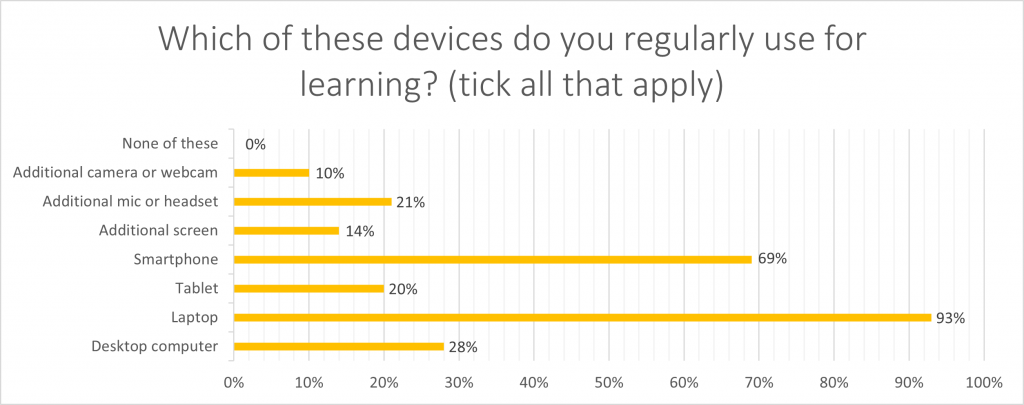
With this information, we are informed for the rest of the survey these are the primary devices that students are using to interact with online learning. Due to this being a tick all question we can’t extrapolate what combinations of devices students are using.
Digital Tools
When students were asked in free text questions about what digital tool or applications were ‘really useful’ for online learning there were two leading applications.
- 43.4% mentioned Blackboard
- 9.4% mentioned Microsoft Teams
As the questions were free text some students provided reasoning for their choice. In the case of Blackboard students mentioned: Accessibility from different types of devices, central to the learning experience, very well laid out and organised.
In the cases of referring to the organisation of modules some students mentioned the issues with certain modules having issues and being not fit for purpose in some modules.
| Question | Agree% |
| Do you agree we support you to use your own device(s)? | 62.56 |
| Do you agree we support you to access online platforms and services off site? | 74.40 |
| Do you agree we communicate effectively online? | 66.67 |
| Do you agree we give you a chance to be involved with decisions about learning platforms? | 36.14 |
In each of these questions we had positive responses from students in terms of the current state of online learning, with some students making a point that they felt uninvolved with the decision making about online learning.
When asked what areas students felt AU should invest in, we saw students leaning towards upgrading or improving current systems with very few students asking for more online support.
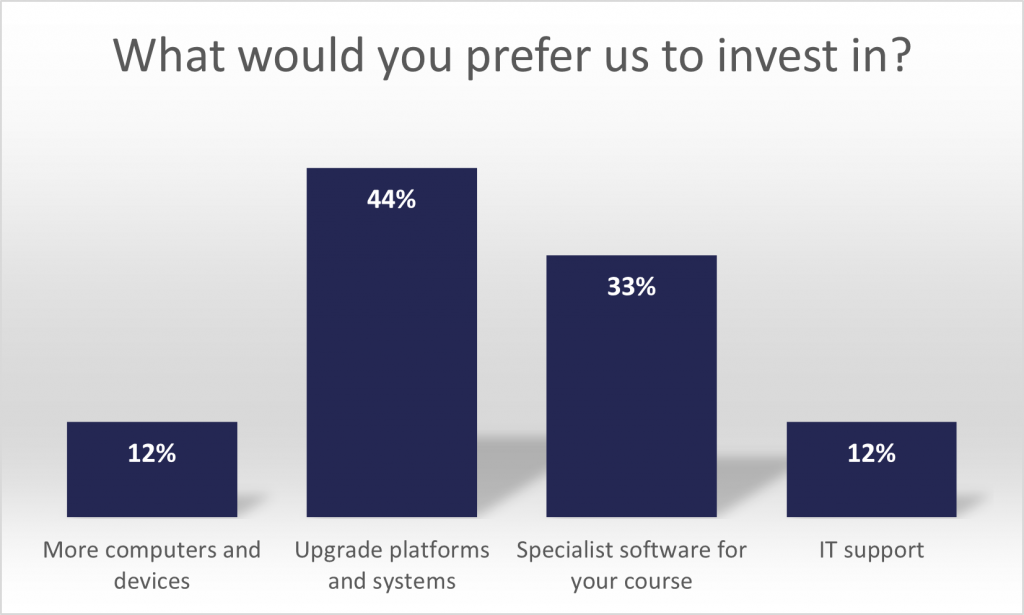
Students were asked what difficulties when it came to online learning. There was a large spike in specifically ‘Poor Wi-Fi connection’. This however doesn’t include any follow-up, so we are unable to check if the Wi-Fi or any of the issues are due to the University or due to the learners’ subjective issues.
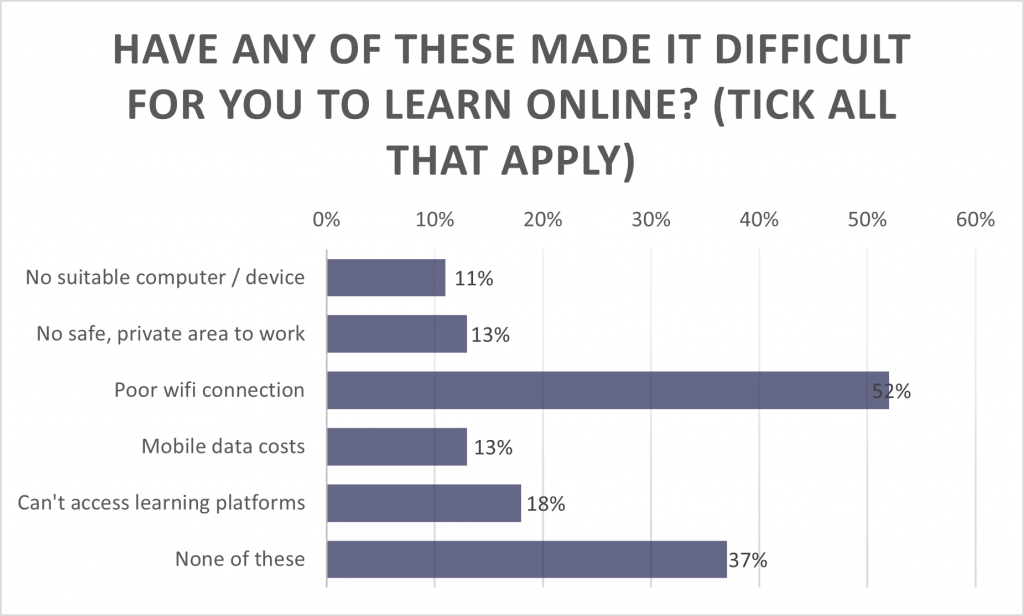
Students were asked what online learning activity or activities they had done in the last two weeks. The highest option was the access of recorded lecturers and classes. This will be highlighted in the free-text analysis, as many comments listed being able to rewatch the material and go over it was a large help in learning.
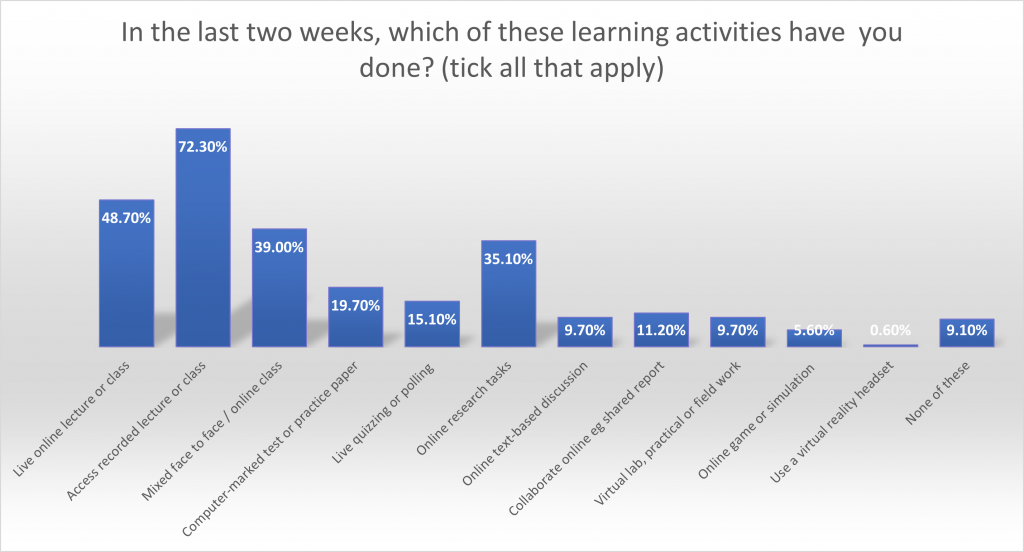
Online Materials and Learning Online
Students were asked how much they agree with statements about online learning.
| Statements | Agree% | Neutral% | Disagree% |
| Online materials are engaging and motivation | 44.30 | 40.50 | 15.10 |
| Online materials are at the right level and pace | 62.00 | 31.00 | 7.00 |
| Online materials are accessible | 77.10 | 20.20 | 2.70 |
| Online materials are available in good time | 66.80 | 27.00 | 6.20 |
| Learning online is convenient | 72.40 | 16.30 | 11.30 |
| Learning online allows to contribute in the ways that you prefer | 51.40 | 27.80 | 20.80 |
| Learning online enables you to make good progress in your studies | 53.10 | 28.40 | 20.80 |
| Learning online makes you feel part of a community of staff and students | 26.20 | 31.20 | 42.70 |
| Learning online allows you to be access fairly | 58.30 | 32.80 | 9.00 |
In many cases we had a positive response from learners, with the learning materials being agreed to be available, accessible and at the right pace. Some students were split in terms of engagement with the materials with a high neutral response.
In terms online learning we once again see a positive outcome in most cases with the only weak spot being an issue that showed up last year, that being the issue of feeling part of the university community in online learning.
Free-text comments
We had over 2,000 free text comments that focus on key aspects of the online learning experience.
The first question asked about the positive aspects of online learning
- 19.3% of students mentioned accessibility
- 16.9% of students mentioned time management and work pace
- 9.2% of students mentioned lecture recordings
- 1.4% of students mention no reason
The second question asked about the negative aspects of online learning
- 20.6% of students mentioned lack and/or difficulty of motivation
- 9.8% of students mentioned distractions/unsuitable learning environments
- 2.6% of students mentioned Blackboard
Final word
Overall, students had a very positive response to online learning with an improvement from last year and when compared with benchmark data Aberystwyth University rated higher than UK data.
When learners were asked about the overall quality of the online learning environment 82.6% rated AU as good or above.
When learners were asked about the overall quality of the online learning on their course 80.4% rated AU as good or above.
